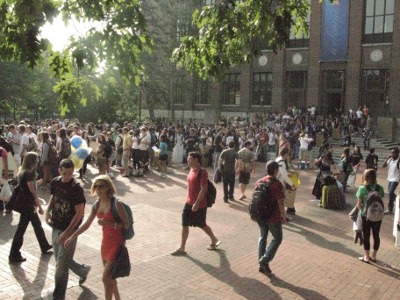Quizzes and the right thing to do at the University of Michigan

University of Michigan Diag
Dwight Lang/Contributor
All of us have probably had a good day at work. Perhaps this feeling persisted for weeks or even months. Everything just seems worth the effort.
My first interaction with Anne occurred during a snowy week three of the 2011 winter semester at the University of Michigan. She was concerned with her initial quiz scores.
To encourage on-topic conversations I give daily quizzes based on assigned readings. (Student names have been changed in this essay.)
“Hi, I’m wondering if you have any suggestions on what I should be focusing on while reading for this class. I read all the articles/chapters and take thorough notes. However, I seem to be having a hard time with the quizzes. I want to make sure I understand the material and am not overlooking main ideas. Thanks, Anne.”
My course — The Experience of Social Class in College and the Community — examines how social class is experienced in a society that avoids straightforward recognition of economic divisions. I encourage students to think about the moral implications of early 21st century class inequality in much the same way Martin Luther King asked us to question race inequality in the 1960s.
Are economic inequalities — routinely experienced by children and adults in all racial groups — simply matters of choice or character? Students explore relationships in immediate and distant social settings: Why are people unequal? Are human beings free? Why is there misery in the world?
I responded to Anne’s e-mail query saying scores of three or four are fine and she should try to not read between words for hidden meanings — as I am mainly testing whether students have completed assigned readings. (Each quiz contains five true/false statements.) She wrote back thanking me for a timely response and finished the term with mostly fives and very few fours.
Anne was a third-year student and always sat in the front row with her friend Diana — also a junior. They were thoughtful class participants and received the highest scores on the mid-term essay exam. During office hours one sunny late-March afternoon, Anne stopped by my office in the Literature, Science and Arts building for a chat.
I learned she grew up in upper middle-class settings where matters of justice and morality were regularly discussed, but conversations were usually not about social class. Anne seemed disappointed, almost ashamed by research showing the scope and intensity of economic inequality.
Particularly disturbing were conditions endured by disadvantaged children for 13 long years in K-12 education — here in Michigan and around the country — where persistently underfunded working- and lower-class schools constitute what I refer to as the “nexus of stratification.”
Images of 6 and 7 year olds arriving at school hungry and anxious challenged Anne and her ideals of a just and meritocratic America. Eventual outcomes for most poor and working-class children are not surprising. Even if highly capable, the vast majority of these children will probably not graduate from college or even attend colleges like the University of Michigan. Anne was emotionally engaged.
As one way to examine the scope and logic of social class differences I use a book titled: "Justice: What’s the Right Thing to Do?" Michael Sandel — a political philosopher and public intellectual — carefully examines social obligations and the morality of inequality.
Students appreciate his analyses and questions, including: Is it just or moral to allow inequalities to persist over time? Do more privileged college students deserve their hard worked for places in classrooms of selective universities — given pre-existing and powerful social class divisions?
I encourage students to reflect on how insidious economic inequalities will shape life prospects of hundreds of thousands of babies born each semester, every year to significant disadvantage.
Conversations often develop in revealing and occasionally unpredictable ways as professor and students disclose their varied class histories and share relevant experiences and knowledge. We explore how social class is visible in diverse settings. Last semester the term ended with an unexpected event.
Each day before class begins, I leave the previous day’s graded quizzes in front of the classroom. One day Anne approached me with a concerned look — recent quiz in hand.
“Professor Lang, I wanted to mention that you accidentally gave me five points — even though I got one wrong. So I should have a four instead of a five.”
She seemed serious and determined. Standing before me was a student who actually wanted a lower score. I momentarily lost focus, but finally managed a response: “Thanks Anne. I’m impressed with your honesty. Why did you tell me that I mismarked your quiz?”
Without hesitation she looked straight in my eyes and gently responded: “It would be wrong leaving class today with a score I didn’t deserve.”
Of course, Anne’s decision would not affect her final grade. But was she telling me what I wanted to hear? Was she struggling with the contradictions of inequality? After years of teaching I believe she simply told the truth.
This late term conversation made my day — perhaps my entire semester.
In recent weeks I’ve been thinking about Anne and my work. I try not to be naive about undergraduate motivations, but I believe students seek to engage social and moral questions. They are interested in important issues like social class inequality. Most are concerned with the right thing to do.
Dwight Lang is Lecturer in the Department of Sociology at the University of Michigan, Ann Arbor and a contributor to AnnArbor.com.


Comments
DBH
Fri, Jul 8, 2011 : 12:03 a.m.
Thank you for this story. These occasional reminders are useful in confirming my faith that, by and large, there are many people who are honest, engaged and not self-centered.